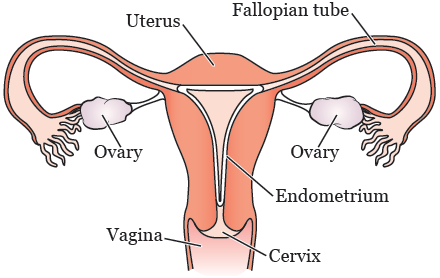This information explains surgeries you can have to help lower your risk for gynecologic cancer.
People with certain hereditary conditions (conditions passed down from parents to children) may choose to have surgery to lower their risk of gynecologic cancer. Gynecologic cancer includes any cancer in a female’s reproductive organs, such as ovarian, fallopian tube, endometrial, cervical, or uterine cancer.
About Your Reproductive System
Your reproductive system is located in your lower abdomen (belly). It includes your ovaries, fallopian tubes, uterus, cervix, and vagina (see Figure 1).

Your uterus is located in your lower abdomen between your bladder and rectum. The tissue lining the inside of your uterus is called your endometrium (en-doh-MEE-tree-um). The lower narrow end of your uterus is called your cervix. Your ovaries and fallopian tubes are attached to your uterus.
About Surgeries to Lower Your Risk for Hereditary Gynecologic Cancer
There are different types of surgeries you can have to lower your risk of gynecologic cancers. These include:
- Bilateral salpingo-oophorectomy (sal-PIN-goh-oh-oh-foh-REK-toh-mee), also called a BSO
- BSO with endometrial biopsy
- Bilateral salpingectomy
- Total hysterectomy
- Total hysterectomy with a BSO
These surgeries are done either laparoscopically or robotically.
During a laparoscopic (LA-puh-ruh-SKAH-pik) surgery, your surgeon will use a laparoscope (a tube-like instrument with a camera) and surgical tools to perform the surgery. The laparoscope is connected to a video camera and television that lets your surgeon see the inside of your abdomen. Your surgeon will make several small incisions (surgical cuts) on your abdomen and use the laparoscope and small tools to remove tissue.
In a robotic surgery, your surgeon will make small incisions on your abdomen and use a robot as a tool to do the surgery. Your surgeon will sit at a console with a 3-dimensional view of the surgical site. They’ll do the surgery from there using a robot they control. You can discuss the best option for you with your surgeon.
These surgeries are described in the following sections. Talk with your healthcare provider for more information about these surgeries and your options.
Bilateral salpingo-oophorectomy (BSO)
This is a surgery to remove your fallopian tubes and ovaries. You may have a BSO if you have a high chance of having ovarian or fallopian tube cancer in the future.
After your surgery, you’ll stop menstruating (getting your period). You may have normal symptoms of menopause (not having your period for at least 12 months). You’ll also be infertile (unable to have biological children). For more information about these side effects, read the section “Side Effects of Gynecologic Surgeries.”
BSO with an endometrial biopsy
This surgery is similar to a BSO, except you’ll also have an endometrial biopsy. An endometrial biopsy is a screening process that takes a small tissue sample from the lining of your uterus. Your healthcare provider will check the tissue sample for pre cancer cells and endometrial cancer (cancer of the lining of your uterus).
Other than some cramping during the procedure, you won’t have any side effects or complications after the endometrial biopsy procedure.
Bilateral salpingectomy
This is a surgery to remove your fallopian tubes but not your ovaries. In certain cases, you may have a bilateral salpingectomy if you have a high chance of having ovarian or fallopian tube cancer in the future and aren’t at the recommended age to have your ovaries removed.
After your surgery, depending on your age, you may still menstruate but you’ll be infertile. A bilateral salpingectomy doesn’t cause menopause unless your ovaries are removed. For more information about these side effects, read the section “Side Effects of Gynecologic Surgeries.”
Total hysterectomy
A total hysterectomy is a surgery to remove your uterus and cervix. You may be having a hysterectomy to lower your risk for gynecologic cancer, because you have uterine, cervical, fallopian tube, or ovarian cancer, uterine fibroids, endometriosis, heavy vaginal bleeding, or pelvic pain. Your doctor will explain why you’re having the surgery.
After your hysterectomy, you’ll be infertile. A hysterectomy doesn’t cause menopause unless your ovaries are removed. For more information about these side effects, read the section “Side Effects of Gynecologic Surgeries.”
Total hysterectomy with a BSO
This surgery is similar to a hysterectomy, except you’ll also have a bilateral salpingo-oophorectomy at the same time as your hysterectomy. During this surgery, both of your ovaries and fallopian tubes will be removed.
After your surgery, you’ll stop menstruating. You may have normal symptoms of menopause. You’ll also be infertile. For more information about these side effects, read the section “Side Effects of Gynecologic Surgeries.”
Side Effects of Gynecologic Surgeries
If both your ovaries are removed during surgery, you’ll stop menstruating. You may have normal symptoms of menopause, including night sweats, hot flashes, and vaginal dryness. If you’re in menopause or have already gone through it, you may or may not still notice some of these symptoms.
Talk with your healthcare provider about ways to manage these symptoms. There are hormonal and non hormonal treatments to help manage them, if needed. Your healthcare provider will recommend a treatment based on your medical history and other health concerns.
You’ll also be infertile after your surgery. If you’d like to have biological children in the future, ask your healthcare provider for a referral to a fertility nurse specialist. For more information, read Fertility Preservation Before Cancer Treatment: Options for People Born with Ovaries and a Uterus.
About MSK’s CATCH Program
If you’ve completed genetic testing and counseling and have a hereditary cancer syndrome, our hereditary surveillance program MSK CATCH (Comprehensive Assessment, Treatment, and Prevention of Cancers with Hereditary Predispositions) might be right for you. For more information, ask your healthcare provider or read MSK CATCH: Expert advice on hereditary cancer syndromes.